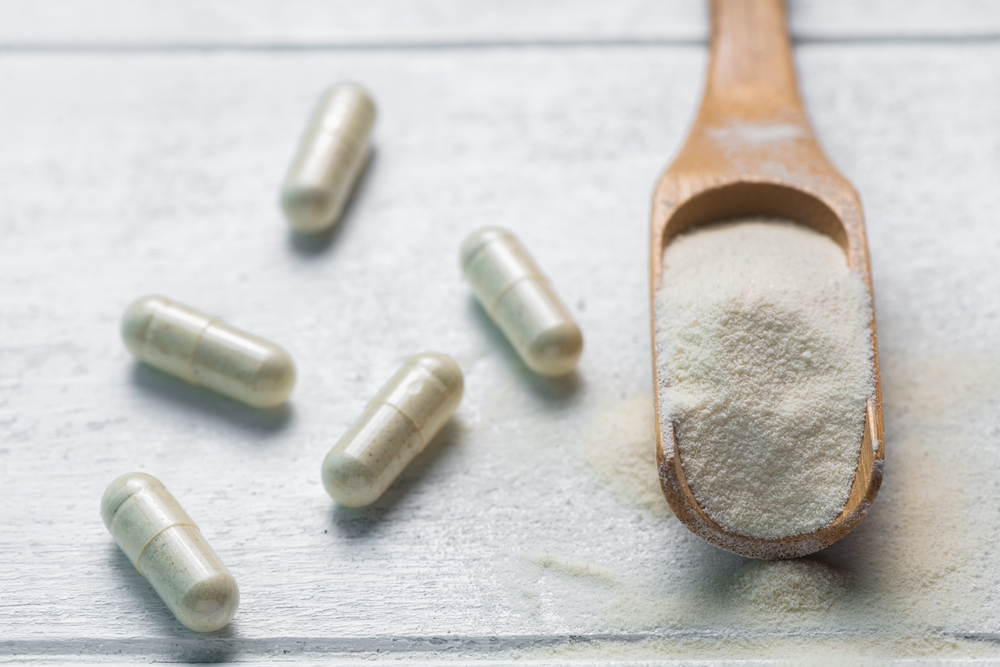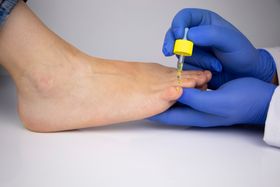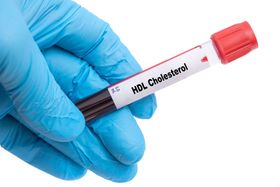Collagen Powder: Types and Benefits
Published May 19, 2022.

Collagen, collagen supplements, and collagen powder are some of the latest buzzwords in the health and wellness industry. But what is collagen?
Collagen is a type of protein that connects your body. It is the most abundant structural protein present in humans and animals. Your skin, hair, nails, joints, connective tissues, gut lining, and arterial walls are collagenous.
What Is Collagen Powder?
Collagen can be found in certain foods, skin creams and serums, and nutritional supplements. Collagen powder is the most common form of collagen supplement, although collagen supplements also come in capsule form. These powders come in many forms, amongst which bovine collagen powder and marine collagen powder have gained popularity.
Why Take Collagen Powder?
Collagen powder is mainly used to cover a nutritional gap and replenish collagen deficiencies and a lack of protein. It can slow down aging, increase skin elasticity, reduce joint pain, increase muscle mass, and reduce bone loss. Collagen powder can even boost brain health, promote better sleep, and enhance your cognitive functions.
Approved Science® Collagen Pills are a great option if you aren’t comfortable mixing and using powdered supplements. These are high absorption capsules that help boost collagen throughout the body.
There is good news for keto dieters too. Considering your requirement, keto collagen is also available.
Different Types of Collagen Powder
There are more than 28 types of collagen, and collagen powder contains one or more of these types. The five most prominent types include:
- Type I Collagen This type is used for strong hair, skin, nails, and bones. It is the most effective type in treating osteoporosis.
- Type II Collagen The second type provides excellent benefits in improving joint and cartilage health.
- Type III Collagen The benefits of this type include increasing skin elasticity, minimizing wrinkles, and strengthening bones and nails. It is also used with type I collagen to heal the gut.
- Type IV Collagen This type of collagen supports cell proliferation and differentiation.
- Type V Collagen Type V helps in forming cell surfaces and strengthens hair and cartilage.
These types of collagen come from different sources. Collagen powders are typically derived from animals, eggshell membranes, and fish. They can be bovine, chicken, porcine, or marine collagen.
The main forms of collagen supplements on the market are:
- Bovine Collagen Bovine collagen contains type I and III collagen. It is mainly effective in skin hydration and improved elasticity.
- Marine Collagen Marine collagen contains type I and II. It is highly effective in improving skin texture and bolstering cartilage health. It is often available as a powdered supplement that can be added to your food or be made into a delicious smoothie.
- Chicken Collagen This form contains type II collagen and also includes eggshell membrane collagen, which has type I and type V collagen. They help reduce inflammation, improve joint health, and strengthen muscles and ligaments.
Benefits of Collagen Powder
A collagen deficiency carries risks and can cause many complications. When the body loses its ability to produce collagen, the tissues they support break down. It shows in your face, nails, and hair. You experience problems with your gut, joints, bones, and muscles.
Supplementing with collagen powder or collagen pills can be the solution. Bear in mind that it may take several weeks before the collagen starts working.
The top benefits of taking collagen powder include:
Reducing Wrinkles
The collagen peptides in collagen powder can help slow skin aging by reducing wrinkles and skin dryness. It increases skin hydration and improves skin elasticity (1).
You can use collagen powder as a nutritional supplement for improving your skin by mixing it into your tea, coffee, shakes, soups, or baked goods. One to two tablespoons of collagen powder can be added to your daily diet for this purpose.
Reducing Joint Pain
Cartilage is a rubbery material that covers your joint. Over time, cartilage wears down due to repeated movement and aging. This causes the bones in the joints to rub against each other, leading to pain and inflammation (2).
Collagen supplements help in the growth and repair of cartilage tissue, thus relieving pain in the knees, elbows, ankles, and other joints.
Aiding Sleep
Glycine is the primary amino acid in collagen, comprising up to 33%. It is an inhibitory neurotransmitter that calms your nerves to help you unwind, relax, and eventually fall asleep.
Glycine is known to be a viable sleep aid as it can help you get into a deeper, more restful sleep state (3). The amino acid also inhibits the activity of orexin neurons, which are critical for arousal, energy homeostasis, and reward-seeking.
Promoting Good Liver Health
Glycine, combined with L-Taurine, is necessary for synthesizing bile salts. It acts as an emulsifier to fats and is essential for the digestion of fat and fat-soluble vitamins. Bile is also important to inhibit the growth of pathogenic bacteria.
When you take collagen powder, you provide the body with glycine that helps produce bile. Glycine also helps reduce the damage to liver cells from toxins. Studies have shown glycine acts as a therapeutic immuno-nutrient for alcoholic liver disease (4).
Regulating Hormones
Collagen can potentially help to reduce menopausal complications because of its estrogen-like effects on bone protection.
Estrogen regulates bone metabolism and supports the development of new bone cells, and collagen has similar functions. This is again the work of glycine, one of the amino acids present in collagen (5).
Speeding Up Muscle Repair Time
Collagen is excellent for recovery. Healing occurs through two critical processes: the regeneration of ruptured muscle fibers and the production of connective scar tissue.
The key to both of these processes is collagen formation. Studies found that collagen powder intake increases the synthesis of muscle cells and accelerates healing.
Improving Brain Health
It has been found that a certain type of collagen, collagen VI, protects brain cells against amyloid-beta (Aβ) proteins, which are widely thought to cause Alzheimer’s disease.
Collagen also helps improve mood. Glycine enhances the levels of serotonin, a neurotransmitter that regulates mood.
Several studies have confirmed the link between glycine and schizophrenia, finding that treatment with the amino acid improved their cognitive and psychiatric symptoms (6).
Side Effects of Collagen Powder
Collagen supplements are safe to consume for most. However, some may experience mild digestive problems, such as:
- Mild bloating
- Heaviness in the stomach
- Constipation
- Reduced appetite
Those who are allergic or hypersensitive to seafood or eggs can get allergic reactions, including:
- Hives or eczema
- Swelling of the lips, tongue, or skin
- Abdominal pain, diarrhea, nausea, or vomiting
- Wheezing
- Dizziness or lightheadedness
Another significant side effect of collagen is hypercalcemia. Many collagen supplements contain products from high calcium marine sources such as shellfish, cod, and mackerel.
Those with a history of calcium oxalate kidney stones should talk to their doctor before starting with a collagen supplement. The supplements contain an amino acid called hydroxyproline that can be converted into oxalate and excreted via the kidneys. In people prone to kidney stones, this can trigger a kidney stone to form.
When starting with a collagen supplement, it is advised to have adequate amounts of water.
How to Choose the Best Collagen Powder
The market is flooded with many forms of collagen supplements promising different benefits. Some points to keep in mind when choosing collagen powder are:
- Source of Collagen Any collagen derived from animals should be grass-fed or pastured. The fishes should be wild-caught. Marine collagen is more expensive than animal collagen, such as bovine or chicken collagen. However, it is easily absorbed in the body compared to the others.
- Form of Collagen Go for the ones that contain hydrolyzed collagen. It simply means that the collagen has been broken down into smaller units easily dissolved in hot and cold liquids. It also means your body can digest this form faster.
- Ingredients Used Some collagen supplements contain many additives with pure collagen. Choose the ones which only have collagen hydrolysate, hydrolyzed collagen, or collagen peptides. But you can opt for collagen with added vitamin C. This particular vitamin helps optimize the efficacy of collagen supplements.
- Third Party Certification FDA regulations aren’t applicable to supplements. Therefore, to be assured of the quality, it is better to choose supplements that are third party tested—for example, NSF, UL, or USP.
- Your Individual Requirements Choosing the best type of collagen powder depends on the needs of the consumer. Whether the person wants it for joint health or wrinkles, your choice of supplement will vary. Type I collagen is good for healthy bones, eyes, and wound healing. Marine collagen is high in type I collagen, while bovine collagen contains both types I and II. If you are taking it for joint pain and inflammation, type II collagen is best.







